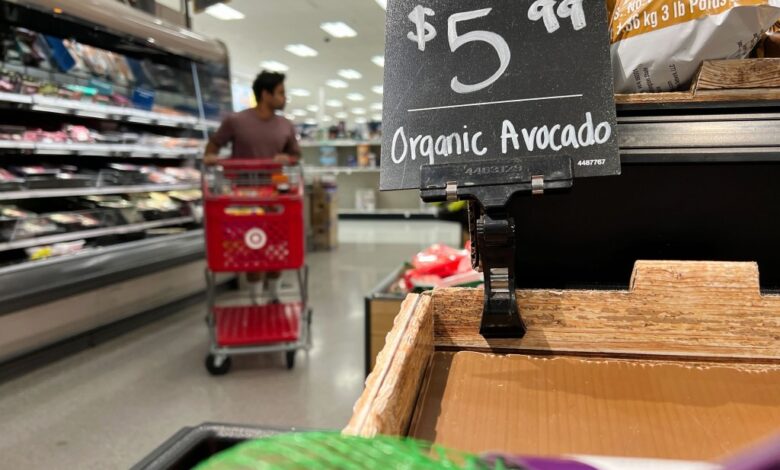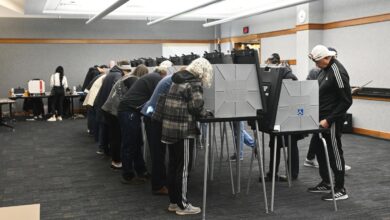Californians have dim view of Newsom’s handling of economy, poll finds

Most Californians are pessimistic about the state’s future and disapprove of how Gov. Gavin Newsom and state lawmakers are handling the economy, according to a wide-ranging poll released late Monday.
But a majority of Californians are optimistic about their own financial future and aren’t planning to leave the state, according to the poll by the nonpartisan Public Policy Institute of California in San Francisco. At the same time, low-income residents reported higher rates of struggling with the costs of housing, food and health care.
“Most people are doing reasonably well,” said Mark Baldassare, the institute’s survey director. “Not everybody.”
Pollsters at the institute surveyed 2,344 adult Californians in five languages between Nov. 6 — one day after Election Day — and Nov. 22. The margin of error was plus or minus 3.1 percentage points for the total sample group.
Asked if they approved of the way Newsom is handling jobs and the economy, 50% said no, 48% approved and 2% didn’t know. Disapproval of state lawmakers’ performance was higher, at 54%.
The institute has asked voters these same questions annually since 2020; this is the first year that support for Newsom’s handling of the economy has dipped below 50%, Baldassare said. After economic anxieties helped fuel Republicans’ sweeping national victory in last month’s general election, Newsom said his fellow Democrats need to talk more about the economy and began touring conservative counties to promote a state economic development plan.
“More jobs,” Newsom posted on his X social media account Nov. 22 touting his effort. “More businesses. Higher wages. Faster.”
But San Luis Obispo District Attorney Dan Dow’s reply — “You’ve been chasing business out of the state and suddenly you want to ‘help’ businesses?” — suggested the governor, widely assumed to be a future presidential contender, has more work to do to win over skeptics.
Newsom has said that “California is where the American Dream is alive and well,” and that as “the most diverse state in the world’s most diverse democracy, California is big-hearted, thriving, inclusive and bold.”
But 62% of poll respondents said that the American Dream — that if you work hard, you’ll get ahead — “is harder to achieve in California than elsewhere in the United States.” Most of the respondents also had a bleak view of the future of California’s economy, with 56% expecting “bad times” in the next year, and 70% felt today’s California children will be worse off than their parents when they grow up.
However, 79% of respondents said they’ll be either better off financially or about the same in a year from now. More than 90% were “very satisfied” or “somewhat satisfied” with their jobs, and more than 80% reported having stable, predictable pay and hours at work. Regionally, some economic indicators such as inflation are improving.
Baldassare said California’s deep political divide is to blame for the discrepancy between residents’ relative satisfaction with their own lives and their disapproval of the politicians steering the state.
“When we’re asking about the governor and the Legislature and the state of the economy, we’re also getting a read on the polarization within the state,” he said. “When we’re asking about personal finance … the differences that emerge are more around where people’s current economic standing is.”
For instance, 44% of respondents earning less than $20,000 said it was hard to pay bills, compared to 14% of those making at least $80,000 per year. African Americans, Latinos and renters reported higher rates of hardship.
Respondents showed support for policy ideas many of California’s ruling Democrats have advocated, including free college (66%) and eliminating college debt (58%), increasing government funding for child care programs (76%) and job training (79%) and giving home buyers $25,000 for a down payment (62%).
But asked about priorities for the next president, the largest share, 52%, said getting costs and inflation under control is a “very high priority,” more than the 45% who similarly ranked building an economy that gives every American a chance to succeed.




